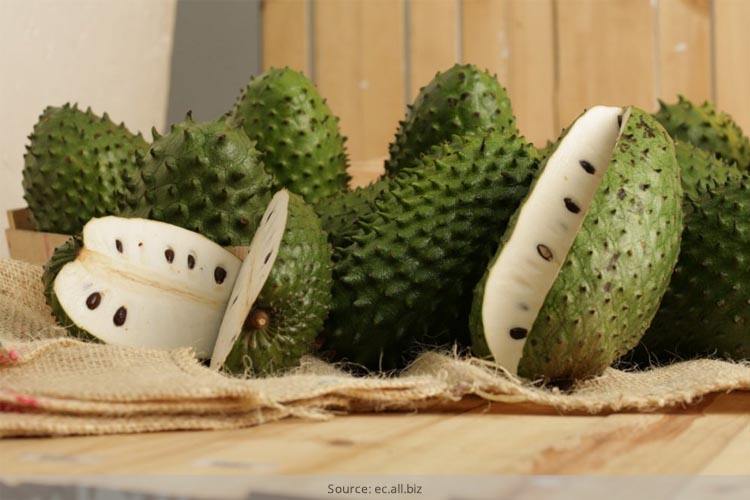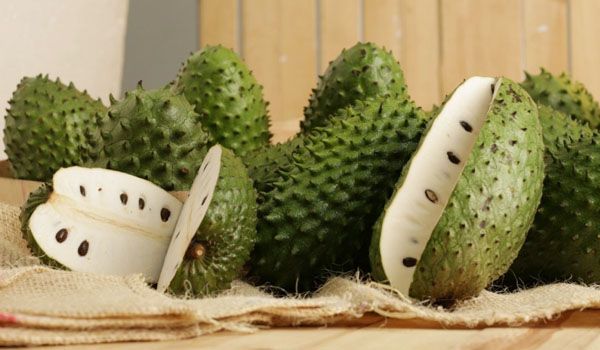
The health benefits of soursop or graviola fruit are plenty. They help to kill parasites from your body, reduce inflammation, improve respiratory conditions, heal skin problems, sedate body and mind, certain cancer types, boost immune system, and relieve stomach pain.
Though not as large as jackfruit in size, soursop fruits weigh somewhere around four to 12 inches wide, six inches long, and weigh around 15 pounds. The tropical fruit is oval or heart-shaped but is irregular in shape mostly because of issues with insects during its growth.
Soursop has a spiny skin that is not edible and is dark green. When the fruit becomes mature, it turns partly yellow and green in color. The fruit has a similar fragrance and flavor to the pineapple and an added musky flavor.
The flesh is an off-white color, granular, fibrous, and juicy. It grows in parts where there is an oval, smooth, hard, black seed, about ½ to ¾ inch long container over 200 or more seeds.
Soursop is one of the first fruit trees to be carried around America, Southern China, Australia, and Western Africa. The fruit has grown in Florida for nearly 110 years and is listed amongst the American Pomological Society in 1879 as a Florida fruit.
Soursop is commonly found in home gardens. The Cuban soursop started selling to Key West, Fla, in 1887 from 10-50 cents each. But Columbia produces the highest-quality soursop and is one of the 14 tropical fruits. Soursop plant is produced in small plots, all throughout Venezuela, which provides the supply for the processing plants. And the strained pulp is preserved commercially in Costa Rica.
Nutritional facts of soursop:
Soursop has a rich content of Vitamin C, several Vitamin B such as thiamin, riboflavin, niacin, including minerals like calcium, phosphorus, and a small content of iron. The fruit constitutes of 67.5% pulp, 20% fruit skin, 8.5 fruit seeds, and 4% core pieces. A 100-gram serving of raw soursop contains about:
- 66 calories
- 16.8 grams carbohydrates
- 1 gram protein
- 0.3 gram fat
- 3.3 grams fiber
- 20.6 milligrams vitamin C (34 percent DV)
- 278 milligrams potassium (8 percent DV)
- 0.1milligram thiamin (5 percent DV)
- 21 milligrams magnesium (5 percent DV)
- 0.9 milligram niacin (4 percent DV)
- 0.1 milligram copper (4 percent DV)
- 0.1 milligram riboflavin (3 percent DV)
- 0.1 milligram vitamin B6 (3 percent DV)
- 14 micrograms folate (3 percent DV)
- 0.6 milligram iron (3 percent DV)
- 27 milligrams phosphorus (3 percent DV)
- 0.3 milligram pantothenic acid (3 percent DV)
Benefits of soursop:
Now, let us take a closer look at several soursop benefits:
1. Kills cancer cells
Although there are no established studies on humans, soursop extracts are known to kill certain types of breast and liver cancer cells. According to a study, soursop cancer cure is proven remedy for several disease types. Although the test has not been conducted on humans yet, the chances are high. One of the most interesting benefits of soursop is related with antioxidant activity which is derived from acetogenins and quinolone, and alkaloids. These have been directly connected with cancer prevention and reduction in tumor size. There is extensive research that has been conducted on the unique organic compounds of soursop. It has been widely studied as an alternative to cancer treatment. These acetogenins are unique to the Annonaceae plant family. The fruits is said to treat blood flow to foreign or non-normal cellular growth and is related with treating breast, lung, prostate, and pancreatic cancers.
2. Rich in nutrients
Soursop is rich is several minerals like iron, sodium, copper, calcium, and magnesium. You may include the fruit in your daily diet to benefit your body desiring these essential nutrients.
3. Treats Inflammation
Most diseases are related to one another, with an inflammatory response. A damage-free radical can cause harm in body cells and destroy our body’s system. The fruit may help to fight off inflammation by supplying our immune system with an extra dose of antioxidants to balance these damaging free radicals. In one study, it was indicated that soursop leaf extracts can protect cells from oxidative damage by searching for free radicals and promoting antioxidant production.
4. Reduces arthritis
Studies on rats indicated that oral use of soursop leaf extracts for two weeks was able to suppress certain inflammatory proteins- TNF-α and IL-1β.7. This test helps in reducing arthritic swelling by 70-80%. A similar study on humans is yet to be conducted.
5. Prevents stomach ulcers
People on NSAID painkillers are more likely to develop stomach ulcers. The mucus lining on your stomach can play a huge role in fighting against ulcer-promoting free radicals. Providing an antioxidant boost can allow soursop to preserve stomach mucus and prevent you from developing stomach ulcers.
6. Used as painkiller
Soursop is commonly consumed as a painkiller. Studies indicate that it inhibits pain receptors and other inflammatory molecules.
7. Help manage diabetes
The extracts of the soursop pericarp (the fruit without the seeds) can help to keep blood glucose in level after a meal. The fruit phenols can inhibit the enzymes and increase blood glucose levels. Another study has indicated that the leaf extract can promote growth of insulin-producing pancreatic cells.
Another risk factor for Type-2 diabetes is hypertension or high blood pressure. It can be reduced by the phenolic compounds present in soursop. Inhibiting the enzyme angiotensin-I converting enzyme, the phenols can encourage our body to become receptive to insulin. This is an added benefit for diabetes and borderline diabetes.

10. Controls seizures
The leaf decoctions of soursop leaf is said to treat fever and seizures in Africa after a study conducted on mice. It is discovered that soupsop extracts have a positive influence on chemically induced seizures and mortality.
11. Improve liver health
The liver is to be blamed to remove bile pigment bilirubin from our body. Patients suffering from jaundice are said to have high levels of this pigment giving their skin a yellowish tinge. In parts of Africa, soursop is traditionally used for treating jaundice. Researchers have shown that the soursop extracts can normalize bilirubin levels in adult rats. In addition, soursop has been shown to protect liver from chemically-induced damage.
[sc:mediad]
12. Protect against infections
Soursop leaves are known for treating skin abscesses and diseases. They contain anti-inflammatory agents which can help in protecting skin against infections. One study on rats showed that the topical application of soursop leaf extracts on cuts can quickly heal wounds and cuts. It was observed that soursop extracts can increase wound healing proteins- Hsp-70.
The graviola is often used for treating infections caused by bacteria and parasites. It has been used for treating herpes, coughs, and vomiting. The bacterial and viral infections can lead to coughing, fever, and sneezing.
13. Improves skin and hair
A US study published that the extract of soursop leaves can help in prevent a skin condition known as papilloma, which causes tumor eruptions on skin. The soursop is said to be good for the skin and its leaves are known to calm down the skin of babies.
There are other studies which suggest the soursop paste can improve hair health by treating dandruff, itching, and strengthen hair.
14. Reduce Eye Disease
Several health benefits of soursop are believed to be derived from antioxidant properties. Studies have revealed that phytonutrients that are present in the soursop are high in antioxidant compounds including terpenoids, flavonoids, saponins, alkaloids, coumarins, lactones, tannins, phenols, cardiac glycosides, and phytosterols. All these compounds can help in fighting off disease causing cells and tumors.
There are other studies that have indicated that antioxidants can help in treating eye disease. The Age Related Eye Disease Study conducted by the National Eye Institute indicated that antioxidants are essential especially when taken as a cocktail of Vitamin C, Vitamin E, beta-carotene, and zinc. This combination help in lowering risk of developmental age related macular degeneration by 25% by those already suffering from the disease.
15. Treats hypertension
Soursop is traditionally used in the treatment of hypertension. This can be added to the antioxidant potentiality of phenols is the fruit. An Indonesian study conducted by soursop indicated that it contains good nutrients that can help in lowering blood pressure levels present in humans.
How to Prepare Soursop and Soursop Recipes:
Soursop is used in several foods like soursop soft drinks, ice creams, candies, custards, soup, cheesecakes, and roasted or fried veggies. It is recommended to avoid eating the seeds due to the presence of neurotoxins. But the raw flesh of the fruit is a great way to relish the soursop fully.
Commonly, soursop is cut into segments and consumed raw. You should make sure to select one that is very soft. If it is green, then allow it to ripen over the countertop or fridge.
To slice the fruit, make use of a knife and cut through it sideways. You will find a fleshy like cream colored flesh. To consume it, make use of a spoon and scoop it out.
The taste of the fruit is sour and sweet similar to a combination of pineapple and banana.
If you are looking for soursop recipes, then here are a few:
Soursop and Cinnamon Milkshake recipe:
Ingredients:
- 1 ripe soursop
- 1/2 cup coconut water
- ½ cup almond milk
- 1 medium frozen banana
- 1/8 teaspoon nutmeg
- ⅛ teaspoon cinnamon
- 1 teaspoon vanilla flavoring
Directions:
- Add soursop, coconut water, and almond milk in a blender. Blend until smooth.
- Add remaining ingredients and blend until smooth.
- For a thicker shake, make of less liquid ingredients. And for a thinner shake, add more almond milk.
- After you get the desired consistency, pour the mixture into a glass and sprinkle cinnamon on top.
- You may also add a cinnamon stick for added touch.
Chilled soursop juice:
Ingredients:
- 1 soursop fruit, peeled, and cut into chunks
- 2 tsp sugar
- 1 ½ cups of milk
- 1/2 tsp vanilla extract
- ¼ tsp ground nutmeg
Directions:
- Start making the soursop chunks in batches against a fine mesh strainer using the back of a spoon or ladle.
- Strain the juice into a bowl.
- Add the other ingredients into the bowl.
- Whisk thoroughly and pour the drink into a pitcher.
- Refrigerate the drink and serve chill.
Soursop Tea:
Ingredients:
- 2-3 soursop leaves.
- 1 ½ cups of water
Directions:
- Add the water to a pot and bring it to boil.
- Shred the leaves into small pieces.
- Add the leaves into your tea cup and pour boiling over it.
- Allow it to sit for 30 minutes.
- You can drink the tea warm or cold. Add honey for a sweet taste.
Soursop Ice cream:
Ingredients:
- 1 cup cream
- 3 cups soursop pulp
- ¼ cup inverted sugar syrup
- 1 ½ cup fresh milk
- 1 tsp vanilla extract
- ½ tsp lime juice
- Eggs (as required)

Source: caribbeanpot.com
Directions:
- Add the pulp, cream, and milk in a medium-sized pot over medium heat.
- Wait until it starts to boil.
- Keep stirring to prevent the ingredients from sticking to the pot.
- Remove from the heat.
- Whip the eggs with the inverted sugar syrup until it forms a creamy consistency.
- Mix the soursop cream with the egg cream. Heat the mixture until it boils. Keep stirring. Remove from heat.
- Whip the entire mixture using a hand mixture until it turns creamy.
- Set it off to cool and transfer onto glass container. Put it back into the freezer.
- Remove from freezer every hour. Whip quickly and then transfer it back into the freezer.
- Repeat the steps four to five times until it gives an ice cream like consistency.
- You can refrigerate the ice-cream in a glass container. Prepare the inverted sugar syrup making use of two pounds of sugar, two cups of water, and ¼ tsp of cream of tartar.
- Mix all these ingredients together them to a boiling point.
- Remove the lid and allow it to cool off completely.
How to eat soursop with caution:
While soursop have lots of benefits, it is best not to over consume the fruit. Here is the best solution on how to eat soursop:
- Eat the pulp and not the seeds: Do not consume the soursop seeds as they are packed with neurotoxins. You may scoop the pulp and consume it after you have the seeds removed. Similar with avocado, ensure the fruit is ripe before you slice it open. You may use the pulp as sweet-tangy flavoring ingredients in desserts and smoothies. But do not consume more than half a cup thrice a week.
- Do not use soursop supplements and tea: Avoid soursop supplements and tea unless you are sure they are safe for human consumption.
- Do not mix soursop while taking medications: Do not consume soursop while you are on certain medications like low blood pressure or blood sugar.
- Watch out for side effects: Stay away from any form of soursop if you notice any health effects like balance loss, tremors, or muscle stiffness. Consult a doctor if necessary.
- Expectant and feeding mothers should not consume soursop: They should not consume soursop as it can lead to side effects.
Side effects of soursop:
- Several experts conclude that soursop have adverse effects on our body. But more studies are needed to prove the same.
- Do not take graviola supplements when you are pregnant or breast-feeding, or on medications. This can lead to an adverse effect on health.
- It has been reported that the soursop seeds contain nearly 50% of oil that is an irritant and can cause severe eye inflammation.
- The Memorial Sloan Kettering Cancer Center warns the use of graviola because of possible neuronal dysfunction and also with connection with Parkinson’s disease due to the presence of a compound known as annonacin, a potent neurotoxin, present in fruit and seeds of soursop. But, in 2010 the French food safety agency reported there is not enough research available to confirm its connection to neurological disorders and soursop.
- However, be careful when consuming graviola and avoid having it if you notice any side-effects.
How to select and store soursop:
- Select fruits with dark green skin. They also have several fleshy spines on the surface. Avoid fruits with blemishes on the skin.
- Storing is simpler. You may store the unripe fruit at room temperature. Once the fruit is ripe, store it in a refrigerator for up to two days.
- It is easy to cut the fruit in half making use of a kitchen knife. Scoop out the inside using a spoon and eat to your heart’s content.
Where to buy soursop:
Soursop is available in several forms. You can purchase soursop juice and supplements from stores or online. If you are buying the fruit, it is best to purchase directly from the nearest fruit store.
This can allow you to properly feel the fruit and make no mistakes in buying the right one.
Conclusion:
The soursop fruit can be highly beneficial for anyone with cancer. However, more studies are needed to justify this reason. But there are other studies which prove soursop have potential cancer-fighting agents to treat infection, posses anti-inflammatory, and antimicrobial abilities, and benefit eye health. Hence, if you have no side effects, this soursop may be beneficial for you.
